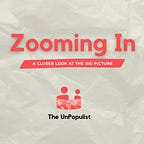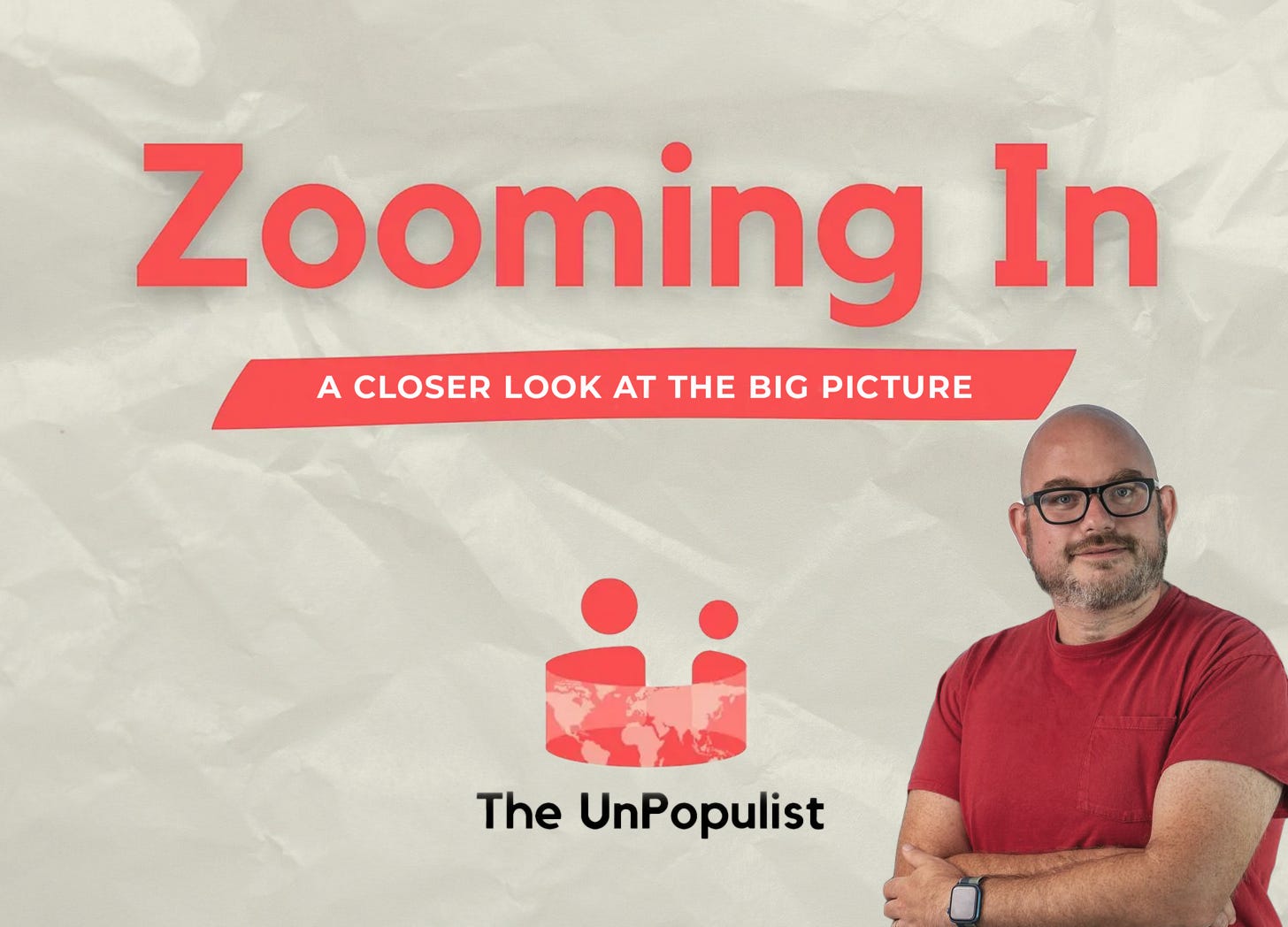Listen to Zooming In at The UnPopulist in your favorite podcast app: Apple Podcasts | Spotify | Google Podcasts | RSS | YouTube
Landry Ayres: Welcome to Zooming In at the UnPopulist, I’m Landry Ayres. On today’s episode, The UnPopulist’s editor-in-chief Shikha Dalmia and senior editor Berny Belvedere are joined by Matt Yglesias. Matt is a journalist, blogger, and podcaster who’s written for The Atlantic and Slate. He’s also a co-founder of Vox and now writes his daily Substack newsletter Slow Boring, which is dedicated to realizing a better world through rigorous conversations and a spirit of pragmatism.
Matt joins us to discuss the media’s adversarial role in politics, how polarization and populism foster conflict, and what both the left and right can do to make sure our politics are more productive moving forward. Enjoy.
A transcript of today’s podcast appears below. It has been edited for flow and clarity.
Shikha Dalmia: Hi Matt. Great to have you here. Let me get the ball rolling by noting that The UnPopulist was founded to study the rise of neo-authoritarianism, especially of the populist variety that is ascendant on the right at the moment, just as socialism was ascendant on the left after World War II. And in a populist dynamic, one of the strange things that happens is that instead of resisting a tyrant, the people embrace him. They see him as one of them. Yet a liberal polity depends on the people jealously guarding their freedoms and maintaining a posture of skepticism toward political leaders.
The other institution that is supposed to hold political power accountable in the liberal scheme is the media, which is supposed to play an adversarial role. How well is the media performing this role right now in this age of populism? Is it realistic to even expect it to perform at this time of hyper negative polarization when each side seems to want to protect its own?
Matthew Yglesias: The media has become a very disaggregated force. I think that's important to understand, because usually whenever people say something about the media, they mean something other than, like, my personal favorite publications, podcasts, et cetera. I do think that, in the United States in the Trump era, what we've traditionally thought of as mainstream mass market media has become both very adversarial to right-wing populist politics but also almost completely ineffectual.
I was watching Citizen Kane the other day, a classic movie, and one of the plot points is that Charles Kane, this would-be really left-populist authoritarian leader, is having an affair with an opera singer. That story gets splashed across the front pages, and that's portrayed as completely destroying his career. Whereas today, it's not that there are no damaging scoops reported about the personal conduct of Donald Trump, say, but it doesn't do the damage that historically we would have thought, because the people who are supporters of right-wing populist movements believe that the press is so adversarial that they now don't care what it says.
You're not having the efficacy that you would want to. You know you talk about corruption which is, I think, the signature weakness of these populist regimes, and Alexei Navalny initially was doing anti-corruption media in Russia. You have a situation in the United States where I think if Trump were to become president again, would just start behaving in outrageously corrupt ways, as he, to an extent, did in his first term. There were stories in the media about [how] he tried to block Time Warner and AT&T from merging because he was angry at CNN's coverage. It's like a completely outrageous, first-order abuse of power.
It was a non-story in the Trump years. Not because it wasn't reported, but because people didn't care. People who don't like him on broader ideological grounds were not that invested in the details of DOJ management. Right of center, free market-oriented people, most of them, they're not interested anymore in what's in the media.
Shikha Dalmia: Don't even get me started on the indifference of free market people being insufficiently perturbed by Trump. To some extent, that's the reason for my existence. Let me push back a little bit on some of what you said. There was a certain Teflon quality to Trump for sure, like nothing's going to stick. I do firmly believe it is partly because of our polarized age—a very powerful right-wing media just refuses to play the role it is supposed to play, to the extent that normal understanding of journalism has become completely muted.
In India, which I watch very closely since that's where I'm from, there is a phenomenon called godi media or lapdog media, which is that Modi has essentially put loyalists of his own in every big media house. They are very much in sync with the regime, and they promote the agenda of the regime. They'll put a positive spin on whatever Modi wants to accomplish. There are embarrassing moments of Modi going scuba diving with this bouquet of peacock feathers recently. The media taped it and dutifully reported it.
I can understand it in India because the press never really had quite a firm adversarial role. It always did play ball with whoever was in power. It's gone to completely new limits because he actually controls the media houses now. In the U.S., it has happened completely organically and spontaneously. When the election results were coming out in the December of 2020, Fox News had this very sophisticated predictive program, which allowed it to call the election in Arizona extremely fast before the other networks did.
The Tucker Carlsons of the world went ballistic as to why their own news channel had done that because they were so in the pocket of a Donald Trump. They wanted to wait. There was the big election steal movement that he was pushing at that time. To some extent, they wanted to be part of it. The producer got fired for calling Arizona. Now, this level of journalistic abdication where journalists live for a scoop and instead of being proud of the scoop, journalists within Fox News were baying for the blood of people who got this scoop. How do you explain this evolution? How do we understand this?
Matthew Yglesias: I think it's striking that, at around this time, there was also a move among some Fox personalities to try to sort of move off of Trump. Some of Rupert Murdoch's papers started promoting Ron DeSantis very heavily. Some of the Fox personnel were saying Biden won the election fair and square. They started losing ratings market share to Newsmax and to OANN, at which point Fox pivoted back to supporting Trump on election-type stuff. Then they wound up getting sued and losing in court. They now have to do this very awkward pivot where they are 99% pro-Trump, but whenever he starts going off about election fraud, they have to cut in because they don't want to be sued again.
You said some of it is spontaneous from inside the Fox ecosystem but it's also that Trump supporters seem to have a much more profound and organic relationship to Trump than they do to these intermediary broadcast figures. This was, I think, evident back in 2015, 2016. Early on, a lot of right-wing media figures were saying that Trump didn't seem that steeped in the canons of conservative thought, and he was not the favored figure. But some people were just like, “No, Trump, he's hilarious, he's great, he's a fighter, he's the guy we need.” They benefited in the ratings, and people came to align themselves with Trump not through coercion of the sort that you see in consolidated, hybrid democracies, but as a ratings, a business play.
There has not been a market niche for, I would say, ideologically rigorous, factual, right-of-center media content. It hasn't thrived in the marketplace. I mean there's a personality asymmetry, because there's incredible levels of interest among left-wing media people and their audience in exploring the question, “Is Joe Biden insufficiently left-wing?” That's just always an issue that has traction in the media. People are very suspicious of that, whereas I don't really hear that about Trump. Like when he tries to maybe wriggle away from the conservative stance on abortion, I don't see conservative media becoming obsessed with the question of, “Well, is he going to sell us out?” He's just flip-flopped on TikTok. Again, there's just not a lot of scrutiny, even on the level of pure ideology. People just really like Trump.
Shikha Dalmia: Right. That goes to exactly the populist dynamic that I'm talking about: that because the people have such a strong connection with Trump, the right-wing media thinks that its role is to reflect that connection and strengthen that connection rather than hold Trump accountable. In the United States, it's doing it entirely voluntarily. The right-wing press is not being told by anybody in positions of political power to do that or they'll lose their access to some important factor of production as in India. They are doing it voluntarily, which goes to the strength of this populist moment that we are in.
Berny Belvedere: I wonder if we can just stay on the polarization idea just for a sec. I remember, Matt, from your days being associated with the #Slatepitch. There’s this weird polarization apologia that I sometimes come across that I wanted to get your take on.
The idea is that polarization is at least somewhat good because it means there isn't a—the word you used was “disaggregated”—there isn't a monolithic news environment, and because of that, fewer stories or angles slip through the cracks in a polarized moment. Let me try to unpack the argument and let me know what you think about it.
When we ask ourselves what ingredients need to be there for a free and independent and even adversarial media to be able to thrive, first of all, you need protection from state encroachment and censorship, and we get that right off the bat in the First Amendment, where it enumerates the freedom of the press. It follows right after freedom of speech in the text, even though the two aren't materially different provisions. You also need the technology in place that allows for the mass dissemination of news, and we've had that for the longest time with the printing processes that we've had and now with various communication technologies turbocharged by the internet. Then you need the market conditions favorable to a robust news industry, which we have with advertising and subscription models on the supply side and other forms like monetizing your discourse presence or being an influencer or whatever.
I want to focus on the final ingredient because this gets to the heart of the question of polarization. You need a persistent demand for this kind of media. You need for there to be a market for independent and adversarial media. If polarization is present in society, it means there's always going to be a large sector within it, no matter which party's in power, that is going to be energized enough or politically active enough to be in ongoing, continual adversarial mode. They're going to want their news operations to be independent from the venues that they see as toeing the dominant party line. Polarization can maybe ensure us a better media environment. I think this argument is really naive, but I wanted to get your take on it to see what's wrong about it.
Matthew Yglesias: I think that there are strengths and weaknesses of different paradigms. In the United States, if you were looking at the situation in the mid-1960s, you would say, “Well, we have this fairly oligopolistic media environment, very little levels of polarization, no sense of the crusading ideological or partisan newsletter.” The result of that is that it was too easy for a time for the powers that be to mislead people about what was going on in Vietnam.
Now we look back and we had this fracturing of the media environment, we had more talk radio, we had the end of the Fairness Doctrine, we had the rise of cable news, and now you can't create that forced consensus reality. State-led efforts to mislead the mass public are very likely to fail because anything you say will face opposition, will face scrutiny. If anything, the challenge is persuading people of things that are true, because there's so much incentive to dissent. The problem is, what you wind up with is every issue approximating a 50-50 dynamic regardless of what the underlying facts are. It's like you can't fool all of the people, but you also can't convince all of the people and the merits of what you're saying wind up having very little to do with what it is people end up believing. That's challenging. A big part of it is on the demand side. You were talking about the economic conditions for robust independent media. In the DC area, there's a publication called the Washington Business Journal and it's for subscribers only and it's local news catering to an audience of local business owners and decision-makers. It covers a limited range of topics but it's really good, but it's also really expensive. The premise is you might actually care what's happening in local government because it's important to your livelihood so you should pay for it. A lot of the stories are a little boring. They're framed very non-sensationally and business press is like that in general.
I'm a columnist for Bloomberg Opinion, but my Bloomberg News colleagues, they publish these very rigorous, very factual, but often tedious news articles on the presumption that, as a financial decision-maker, you actually want to know, like, what's happening with Caterpillar or what's happening with appliance regulations or whatever else. Most citizens don't engage with the news in that way, I mean, we're reading articles primarily for entertainment or for expressive values. That just does not encourage anybody to report to you things that are going to be dissonant.
You talked about #Slatepitches. The classic #Slatepitch is, "This person, who all things considered I think is a bad guy, is actually correct about this specific thing he's saying right now."
That's just always unwelcome. People want the bad guys to be wrong about everything. If you ask someone like, "Is that true? Is anyone wrong 100 percent of the time?" They're like, "No, the world's more complicated than that.” But presented with that complexity, it's like the human mind rejects it.
Berny Belvedere: So, there's a sense in which a disaggregated, disintermediated, a decentralized media environment can be stomachable if there is enough good faith among the different sectors. When instances of that are possible, that ensures that the epistemic mess that we're in is not completely unbridgeable.
Here's where I think populism has a particularly different challenge to it as a political orientation than others in terms of torpedoing the possibility of this shared media space. One of populism's abiding traits is its stress on the virtuous folk against the predations of the elites. If you think about that dynamic, it manifests itself in various ways. One of those ways is that it expresses an ongoing contempt and at times even vitriol for various gatekeepers in society.
In a political context, you've got the quote-unquote “establishment," you've got the swamp, you've got the weird phenomenon where a purely descriptive term like “beltway” is turned into an insult within populist subcultures. In a media context, you've got the MSM or mainstream media populism needs in order to fan its flames, an institutional foil to go up against, so Trump's infamous “enemy of the people” stuff comes to mind, but also various figures within the heterodox space—say, Bret Weinstein—who are reflexively distrusting of mainstream institutions, including media. Someone like that comes to mind too.
Our situation today is that there's an entire political orientation, populism on the right, that is dependent on being existentially troubled by society's various institutional layers. I'll give an example and then I'll let you answer. The way COVID intervention, which was always going to rely on the forms and practices of elite management (things like scientific expertise, bureaucratic control, discourse and opinion gatekeeping) that was always going to be a feature of the way we managed COVID. But that also meant it was always going to be demagogued and distrusted by the right-wing crank machine because it's institutionally presented. So, what can the mainstream news industry possibly do to win trust in a context where this group of people just views distrust of elite institutions as an inherently ennobling act?
Matthew Yglesias: That's a difficult question. I'm not exactly sure what you could do. One thing, though, is that I do want to urge decision-makers at different media organizations to think about what it is they really want to do. Something that I've noticed in a bunch of places that I have worked over the years is that often the people who cover politics are the most—in part, I think because they cover politics—are the most balanced in their approach to it. Whereas the people who aren't primarily writing about politics tend to be very left-wing. Like America's theater critics, it's like a hyper-left group.
I think that editors don't always consider how seepage of the personal political opinions of sports writers, food writers, creates an impression of the overall institution as just a hostile, alien type of space. You'll often see this, like The New York Times will hire somebody who's maybe right of center and then there'll be controversy about it because most of their readers, most of their staff, are left of center and they're like, "Why do we have this guy?" Then the reason is always like, "Well, we want to be credible with broad audiences.” But I feel like having a Ross Douthat on staff as an opinion columnist buys you very little goodwill in practice. I like his work, but in terms of making conservatives think that The New York Times is good, it doesn't deliver. Whereas having leftist asides and presuppositions built into coverage, that the decision makers probably don't think of as being about politics at all, consistently sends to people a message, “this is not for you.” That makes it that much harder again to be credible in these kinds of spaces. COVID was particularly difficult on many different levels, starting with the fact that, the man who was president of the United States at the time just didn't really engage at all in the question of, what was the outcome that he wanted. He was very unclear.
I go back and I run back the tape, he adopted this strong anti-lockdown persona only after having imposed one, which came after he gave people a lot of false reassurance. Then somehow his own incredible gyrations on this topic became an example of how you couldn't trust the establishment. The thing that I always want to say to people— people like Bret Weinstein, people who I see engage in this relentless project of tearing down the so-called experts of the mainstream, and they often raise good points—the question is always, “Compared to what?” Nothing in life is perfect. It's challenging to make decisions in uncertain frameworks. I've never found a, like, alternative source of information that's actually in a consistent way better than listening to established voices. Which is not to say you should listen to anybody blindly. That's what drives me crazy about the modern populist mood. It's just not true that, if you follow Bret Weinstein's Twitter feed, you'll get reliable information about these topics. People instead, they just flit around and adopt the confrontational posture of the moment. I've got a 9-year-old and I associate a lot of this with childish behavior. Kids don't like to be told what to do, which I get, and I empathize with, but you can't listen to them.
Shikha Dalmia: A lot of good points there, Matt. I'm wondering, what you described as the internal newsroom, news culture dynamic in, say, The New York Times, where the political journalists are in it for a very different reason than the app makers and the developers who go there, they leave their high paying jobs at Amazon or Google or what have you, and they go into a news industry because they are ideological. They want to be doing good and they realize, well, the political journalists over there are just trying to get it right, they want to do good too, but they're also trying to get it right.
It leads to this weird dynamic and internal conflict and tension in The New York Times, where the reaction to a Tom Cotton op-ed from the non-news staff is stronger than the news staff. To me, it suggests that there is still a fundamental divide right now between the liberal press, which is biased, but trying to get things right, versus the right-wing press, which wears its biases on its sleeve and is proud of them. There can be potentially a corrective to the liberal biases of The New York Times that it'll never get any credit for but there is no corrective in the right-wing media universe because it's so fully captured by this populist moment that we are in which is reflected in our politics, too. Republicans have no interest in transactional politics anymore. I say this as somebody who comes from the center-right and never voted Democrat till Trump came along. How do you correct it? There's something asymmetrical over here, how do you get to it?
Matthew Yglesias: Yes, I don't know. It seems like part of what has happened is that a disposition toward liberalism has always been a somewhat minority persuasion in the public but a disproportionately elite persuasion that exerted additional influence and used to be spread across both partisan coalitions. Part of the dynamic is that Trump has expelled right-of-center liberals from the right-of-center camp in a way that can be heartening in some ways, but it's created a much more unbalanced political system in which I don't think that a more liberal left-of-center is capable of carrying the day on its own because people just disagree about all kinds of underlying policy questions.
People disagree about abortion rights, and they disagree about how Medicare should approach prescription drug pricing and most people care more about those kind of day-to-day issues. This alignment of education with partisanship, with liberalism, with cosmopolitan dispositions, makes it really challenging to have both functioning social institutions, but also to have a safe democratic space because it seems inevitable and natural and correct to have right and left coalitions alternate in power. That's part of how liberalism works: that we all have our ideas about how things should go, but we also accept if there's going to be overreach and correction and counterbalance; also, that there's tension always between liberalism and democracy, but that you need to have a democratic system and that means that people are going to get what they want to some extent even if their preferences aren't exactly mine. We want to have this discursive political system with a back-and-forth.
I look back on George W. Bush's presidency, which I've really disagreed with in really profound ways and which, in some ways did things that were more concretely harmful than anything I saw Donald Trump do. John Kerry went to the people in 2004 and they didn't like what he was selling. I found that very disappointing and very frustrating and very alarming, but also it was the rules of the game.
Democrats retooled in 2006. They've recruited a lot more rural candidates and moved to the center, to an extent, on guns—and they won. Then, Bush's policies started generating visibly bad results. There was a huge move away from him. That feels like politics as it is meant to be practiced. I don't know. I'm curious about what you think. It makes me sad when I see Mitt Romney decide that the Republican Party doesn't work for him anymore. What he's going to do is he's going to quit the Senate. That, to me, just makes things worse.
Shikha Dalmia: Yes. On the other hand, it may make it worse, but, you know, Mitt Romney staying in the Senate and being so ineffective is also not a fun thing.
Matthew Yglesias: Yes.
Shikha Dalmia: I mean, I take your point on all of this, but I also think that … I see myself as a reformist on the center-right. I think the forces of cynicism and nihilism have gotten so out of whack on the center-right that there needs to be some corrective from within. I don't think if you have a corrective from without, it's going to work. Because that's just going to feed into the culture war dynamics. If you tell the right, "Well, you got this cancel culture story wrong," they're just going to turn on you if you're from the left. But I think if somebody who's from within the right does some fact-checking and some correction and says, "No, things are not so bad," maybe you have a prayer. That said, I also think that the right is like it's reached some kind of escape velocity. I remember when you were back at Vox, I actually think that that's a time when peak wokeness had been reached and there were reform currents within the left pushing back against some of the wokeness in the universities.
I give this example often. Vox ran an anonymous piece by a liberal professor about how his liberal students …
Matthew Yglesias: Yes, yes.
Shikha Dalmia: You remember that, right?
Matthew Yglesias: I do.
Shikha Dalmia: Yes. I thought it was a great piece. What was the right's reaction to that? It was not that, "Okay, these social corrective mechanisms are now kicking in and we are beginning to make inroads on the excesses of the left." It was to double down on the culture wars. Tomorrow, if cancel culture were to be cut in half or completely disappear, this sort of right-wing, anti-woke universe—because it feeds on itself, it's monetized itself, is going to continue to lambast the other side. I don't know what to do to bring them back to reality and make them interested in just a basic liberal project again and show them it has yielded some rather good results.
Matthew Yglesias: Yes, I want to try to get regular people who read things to understand that there is money to be made in keeping you as spun up as possible about everything. The dynamic around that piece in Vox … it happens all the time. You'll see that whenever an ostensibly left-of-center institution makes some gesture of reasonableness, there's a lot of pressure among people on the right to reject it, to say that didn't happen. If I say something, people who don't know that much about me, but they saw me tweet some positive things about Joe Biden in the morning, then in the afternoon, I'm like, "I think it's bad when people commit crimes,” they'll be like, "Well, where were you on that?"
They don't ask themselves, like, “Where was I?” It's like they want to believe that everyone who's not 100% with them is maximally unreasonable on everything. That's the mentality that keeps you in the playground rather than thinking critically about anything. I remember a very classic argument on the right about liberals is that they will present an exaggerated account of the extent of racism in America in order to generate this very monolithic 90% African American vote for Democrats, which, like, nobody could have that level of consensus about concrete public policy issues. They're correct on some level that’s, like, leveraging identity, "Those people hate you. You have to vote for us. Don't think about, do you actually agree with us about abortion or whatever? We're the only ones you can trust."
Conservatives have started really running that play on this huge swath of predominantly White America. It requires you to just not ask yourself, “Is it actually true that left-of-center institutions are as monolithically far left as we are saying?” People do that for personal gain—that’s not analysis. You need to ask yourself whatever it is you're reading all the time, "Is this true?" "Does somebody just want me to hit retweet on this or give me a little heart?" "Can I kick the tires on this bombastic statement?" I just see it constantly: people clearly overstating for effect, things that they can't possibly really believe about the state of things. It matters what you say.
Berny Belvedere: I think in such an environment, it can become alluring to think that if you could just level with the American people, they would accept what you're saying, and we would enter into a far more informed and virtuous moment. If the news would just stop doing those things that you said, which is reflexively exaggerate the rightness of their position, to never cede an inch to the other side, etc. You remember the Vox cards that you guys would come out with and the explainers? I thought this was a great resource for people but let me bring in Aaron Sorkin here. I think The West Wing immediately comes to mind when that name is invoked. But I want to ask you a question based on a different Sorkin property, The Newsroom. The thesis from that show was that if the public were truly leveled with, if genuinely objective news reporting were prominently available to the masses, we'd have not just a more informed citizenry but a more virtuous citizenry. The lead character Will McAvoy spends the series in anguish over corporate demands, clickbait, shallow coverage. He thinks doing news "the right way" would have a profound effect on society. Is that hopelessly naive? Why or why not?
Matthew Yglesias: It seems a little fantastical. They’re delivering an account of a bygone day when TV news personalities could shape events in a much more profound way than I think is possible right now. I do think it matters, though, the character and decision-making of people in positions of influence. I've seen recently a lot of people on the Trumpist right pushing for a federal effort to either ban TikTok or force ByteDance to divest it. They've been pushing this for a long time, and it looks like they might get their way out of Congress. They got a huge bipartisan vote and supported their position. Then right as action is coming on this, this very important conservative donor who is an owner of TikTok and investor in TikTok met with Trump and agreed to give him money and then Trump flipped his position on this. That puts people like Peter Thiel in this awkward position where Trump has flip-flopped on them.
These are rich people with means, they've got their podcasts and whatever else, but also, they don't need to be media success stories. They can choose to say to their audiences, "What happened here I think is bad. I think it reflects poor decision-making," not just act like courtiers, who are in the true spirit. So far, I haven't seen it. Like why does liberalism exist at all? Like why don't republics all immediately collapse into authoritarian dictatorships? It's because the leader's own political coalition includes some level of disagreement about topics, right? To be an effective democratic leader, you need to get a bunch of people to vote for you who don't all agree with each other about everything. Then those people in your coalition don't just trust each other with infinite power. They want to continue to have electoral institutions, ongoing competition, free media, et cetera.
I see people inside the Trump coalition now not responding to their own disagreements in a way that I think would reflect integrity. There are clearly people in the Republican Party who still believe in the benefits of free trade, but they're not saying that, they're not dramatizing to people that, ”I voted for Trump because I thought he was better than the other person, but I think his analysis of this topic is significantly mistaken and that other people are misleading the public about this." That must be what they think. It's not possible that there was a 100% turnaround on a totally classic and slightly boring public policy topic. People feel that they need to be on side all the time, including people who don't have that much to lose. That's very frustrating. You talked about Mitt Romney's lack of efficacy as a senator, and that's the same thing. This is a guy clearly at the tail end of his career. He's a wealthy and successful man. He's got a great family. If he were to have lost a Utah Senate primary, it's not the end of the world for him. He conveyed via smoke signals to liberals how he felt about things, rather than being engaged in a meaningful way that would have made a difference to a public of conservative Mormons who live in Utah and who might care what he thinks.
Shikha Dalmia: I completely take your point that populism is a not a sustainable long-term governing model because it doesn't have a solution to the problem of disagreement that you mentioned that how do you build coalitions out of people who may be aligned in some ways, but may also have fundamental disagreements? The populist solution to that is sowing fear, making the price of disagreement or the cost of disagreement extremely high. That's what Trump has done.
The first thing that, in a populist moment, happens is there is a flattening of resistance from within the own party. Trump has remade the Republican Party in his own image. The points of resistance that you would expect from the Mitt Romneys of the world, they just get flattened. That's a big problem right now in the Republican Party. The media has fallen in line. The Republican press has fallen in line. The reason they have done it is because Trump has a very direct connection with his base and his constituency. It may be diminishing, but it still has a pretty sizable clout within the right. Even though I'm an optimist and this will burn itself out, you have to prevent it from doing a whole lot of damage here and now. What should the strategy be? Should we wait it out and let it run its course, but that may take a long time, or we find ways to expedite its fall? What would be the strategies for that, both politically and in the media?
Matthew Yglesias: Yes, it's hard to know. One thing is I want people on the left to be more welcoming of converts, which is not the left's strong suit in terms of these kinds of dynamics. I want to encourage right-of-center people to fight, to not just assume that it will pass. It's disappointing that the reaction to the 2020 election was this election denial and this Trump comeback but I do think that, if Trump loses in 2024 to Biden, there is another opportunity for Republicans to look themselves in the face and say, "What happened here? We decided that this guy was a genius because he won in 2016 while losing the popular vote when almost nobody has ever won three presidential elections in a row." Just like, “Why are we doing this?" Because so much of the current populist moment is built off the presupposition that Trump delivers something extraordinarily valuable to the American right. I just don't think that that's true. Analytically, I don't think it holds up to much scrutiny. If he wins, that will reinforce this false presupposition. Whereas if he loses, that's just another chance for everybody to ask themselves, "What are we doing here? Couldn't John Kasich have just been president for the past eight years and we'd be getting everything that we want?" But also, lots of moderate people who are alienated by wokeness or whatever would be saying, "Yes, this Kasich guy, he seems sensible." Instead, right now, Trump markets were in fact just political downsides and personality deficits as some kind of highly effective means of beating the left.
That's not true factually, and I don't know what else to say about it other than him losing is the best evidence that this is not working. One of the things he did is he convinced people that Barack Obama getting reelected in 2012 somehow proved that conventional conservative politics had completely failed but meanwhile, you have Larry Hogan as elected governor of Maryland, Charlie Baker in Massachusetts. Lots and lots of people can mobilize centrist sane opinion against the excesses of the left.
It's honestly not that hard. The left is not that powerful, actually not that appealing, and the proven way to beat them and neutralize them is just to put a normal-seeming, competent, minimally empathetic person in charge. Because the left's whole calling card is empathy, just, like, "We care." Having an asshole who just conveys the opposite of that about everything is empowering to the left, not disempowering.
Berny Belvedere: Matt, I wanted to ask about Slow Boring. What was the thinking there initially or how has the thinking developed? What niche in the media universe do you want it to fill, do you feel like it's successfully filling?
Matt: There's a few different things, but one is just, I wanted a niche to say what I think about things without getting yelled at too much by my coworkers. I also want something that I think a lot of us do: to do media that's engaged. I try to be both correct in a way that I think some media outlets get fuzzy and ideological, but also frank about what I think. If the point of a piece I write is that you should vote for Joe Biden, I will just say that instead of trying to smuggle it in through some weird framing angle.
The one legacy of old, neutral media that we've hung onto is that news reporters never say what they mean. I don't think that that has been incredibly constructive. Because something I always learned as a magazine writer, an essay guy, you actually state a thesis in your piece then you marshal evidence for it and present an argument. A lot of what happens in journalism now is in this weird tweener space where you don't have a thesis statement, but it's clear that the author is coming from a very biased position.
The UnPopulist is framed around liberalism—I’m framed more around, I think, the idea of pragmatism. Where it overlaps is pluralism, that you live in a society in which people want to advance their interests through the political system and which people's preferences and ideas vary. You're not going to score some kind of knockout blow where we win on a bold agenda and then all our ideas are enacted, and politics ends. That's a childish way of thinking about politics that a lot of grown-ups have gotten invested in.
Mine is called Slow Boring, it's a reference to Max Weber. I think the critical element of liberalism as a disposition is just this recognizing that we're living in a society together that has a lot of different people in it, and they think and want different things. We're trying to navigate that, which involves trying to convince people, "You're wrong and I'm right.” But also trying to practice like politics is a team sport where you recruit people rather than exile them, where you try to develop solutions that are going to be sustainable rather than based on the idea of vanquishing our enemy and trying to get people to understand. I like the new Dune movie that's out in theaters because I think it's about this in part but this idea that this--
Shikha Dalmia: I'm the only one who has not watched it.
[laughter]
Matthew Yglesias: There's something very seductive about this idea of the messianic savior who leads your people to triumph, but the movie illustrates it's quite dark where that takes you. That does not work.
Shikha Dalmia: It's interesting. I met you way back when you were in a very different political place. You were much more progressive, and I would even call you radical and you've kind of shifted to the center now. I've actually had a similar evolution. I'm still free enterprise, but much more towards the center and even towards progressivism.
The way I describe myself personally, and Berny can tell me how he describes himself, but I describe myself as essentially a Burkean progressive. I appreciate certain progressive ideas, I'm still an old-fashioned liberal in that I believe in liberty and equality, and all that good stuff. I think there are lots of injustices that still need to be addressed and amended. The way you do it is through liberal proceduralism and deliberation where you talk it out and enact it, and you are not going to do it through radical reforms or by making somehow politics irrelevant to the game.
I have a big, big problem with lots of folks on the libertarian right who are anarchists and who somehow think that politics can just be removed from life. You can have some big private companies to whom you can outsource law enforcement and defense, and what have you, and live in some kind of a utopia as if politics is not endogenous to the game. As if you are going to do away with disagreement and decision-making, and all of that, just because now you've decided you're not going to have a government. I'm very much, I think, in a similar place to you, Matt, in my old age, and you in your middle age. [laughs]
Matthew Yglesias: I think there's a convergence when you start to acknowledge that politics will continue, and also that the contemporary United States of America has its many flaws and many things we could say about it, but is pretty good. There's not a lot of historical examples of people's lives being better than they are in the here and now for most of us.
You said “Burkean,” and that's just prudence. I think in a completely different time or place, I might have a much more sympathetic view toward radicalism but really in the richest country in human history [the idea that] we need to overturn everything and gas people up with the most exaggerated accounts?
At a certain point, to me, it doesn't make sense. You need to do a different kind of politics.
Berny Belvedere: I just want to say, Matt, thank you so much for joining us.
Matthew Yglesias: Thank you. Thank you.
Shikha Dalmia: Likewise, Matt. This was a lot of fun. Really fun.
Landry Ayres: Thank you for listening to Zooming In, a project of The UnPopulist. For more like this, make sure to subscribe for free at theunpopulist.net. Until next time.
© The UnPopulist 2024
Follow The UnPopulist on: X, Threads, YouTube, TikTok, Facebook, Instagram, and Bluesky.


















